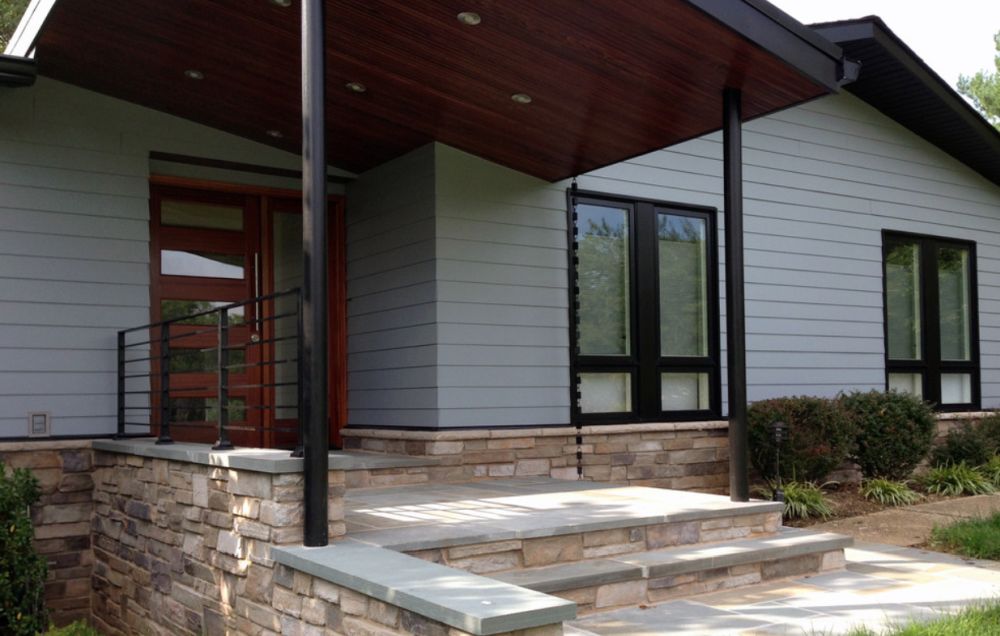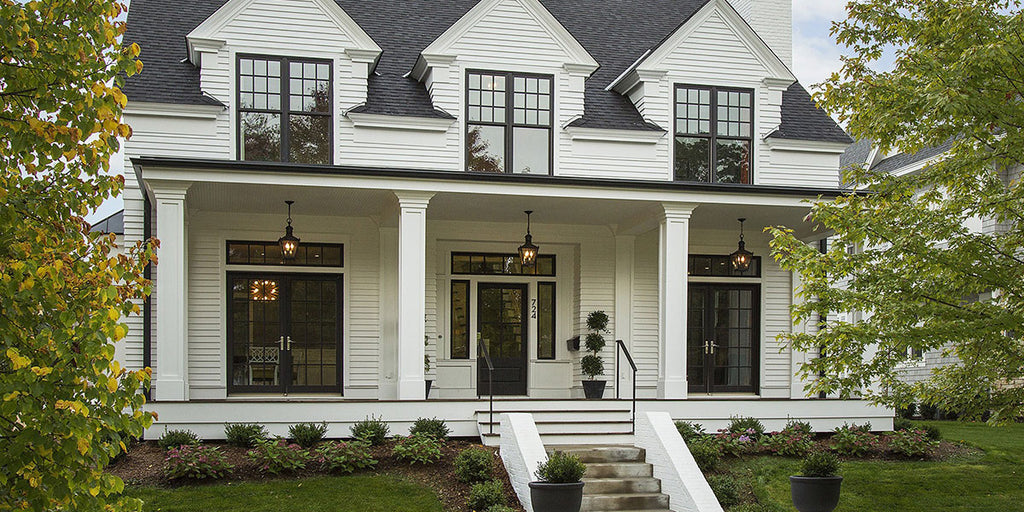
There are a lot of things to consider when designing the exterior front stairs of your house. Safety should always be considered. A staircase that's built incorrectly can lead to falls or slips. A staircase should be both stylish and functional. Here are some guidelines that will help you achieve this.
First, choose a material which can withstand extreme weather conditions. You might choose to use PVC, treated lumber, or another material that can withstand harsh elements. These materials are both durable and easy to work with. To avoid any accidents, make sure that the stairs are well lit.
The front stairs are often the first thing people see. You can include interesting features like a built-in planter to entice people. Or, you can even paint a mural. You can do this by selecting a color that matches the rest of the house. The artwork will pop if it is painted on the staircase.

Another important factor to consider is the space available. It is important not to make your front steps too long. You don't want your front stairs to be too big or cluttered. There are two options: you can either create a mini-landing area at the top of the steps or at the bottom.
Integral lighting can be added to your front steps for safety. These will make it safer to walk on your front steps at night and easier to negotiate.
If you are in the market for a little modernization, you might be tempted to install an elegant metal railing on your front staircase. For more complicated designs, this can be a great idea. This can be combined with concrete steps to give it a modern look. You can mix and combine colors to get the perfect color combination.
If you have the money, you might consider hiring a professional to build the front stairs of your dreams. You will need to find a reputable contractor who can provide you with a quote for the project. You need to be happy with your final product regardless of whether you hire someone to do the job or you DIY it.

Do your research while you're at it. It is important to research the available materials. PVC, which is an inexpensive material, can be used to repel insects. In addition, you can also choose a more expensive wood such as cedar. A textured finish is a good option for children who are young.
You should also consider the many benefits of LED lighting. You should actually consider installing strips of LED lighting underneath the stairs' overhangs. This not only looks nice, but it can help you save on electricity bills. This is especially true when your home gets a lot natural sunlight.
Your front stairs are an important component of your home. Therefore, it is important to carefully consider the design and function. If you have the right steps, your property will be a proud place.
FAQ
How Much Does It Cost To Renovate A House?
Cost of renovations depends on the material used, how large the job is and how complex it is. Some materials, like wood, need special tools like saws and drilling while others, like steel require no additional tools. The price of renovations will depend on whether you need your contractor to do everything or if the work is done by you.
Home improvements can cost anywhere from $1,000 to $10,000 on average. If you plan to hire professionals, the total cost would range from $5,000 to $25,000. You could also spend as much as $100,000 if you do it all yourself.
The final cost for renovation depends on many factors. These include the material used (e.g. They include the type of material used (e.g., brick vs. concrete), the size and number of workers involved, as well as the length of each project. When estimating the total cost for renovation, it is important to keep these factors in your mind.
Do I need an architect or builder to help me?
It may be simpler to hire someone to help you renovate your home. If you're looking to purchase a home, an architect or builder can help you achieve your goals.
Are you able to live in a renovated house?
Yes, you can live in your house while you renovate it.
You can live in a house that is being renovated while you are renovating it. The time taken to complete the work will impact the answer. If the renovation takes less time than two months, then no, you can still live in your home during construction. You can't live there if your renovation project takes more than two months.
You should not live in your house while there is a major building project underway. This is because you could be injured or even killed by falling objects on the construction site. There is also the possibility of dust and noise pollution from the heavy machinery at the job site.
This is particularly true if you live on a multi-story home. The vibrations and sounds that construction workers create can cause damage to your property and contents.
As we mentioned, temporary housing will be necessary while your home is being renovated. You won't have all the amenities of your home.
As an example, your washer and dryer will be out of commission while they are being repaired. It will be difficult to bear the smell of paint fumes as well the sounds that workers make.
All of these factors can create stress and anxiety for you and your loved ones. So it is important that you plan ahead so you don't feel overwhelmed by all the circumstances.
When you decide to start renovating your home, it is best to do some research first so that you can avoid making costly mistakes along the way.
You should also seek professional help from a reputable contractor to ensure everything runs smoothly.
How to quickly sell my home without having to pay realtor fee?
If you want to sell your house quickly, then you should start looking for buyers immediately. This means that you should be willing to accept whatever price the buyer offers. You will likely lose some buyers if you hold off too long.
How can I avoid getting ripped off when renovating my house?
You can avoid being ripped off by knowing exactly what you are getting. It is important to carefully read all terms and conditions before signing any contract. You should also not sign any unsigned contracts. Always ask for copies of signed contracts.
What should I think about when buying a house?
You need to ensure you have enough funds available to cover closing costs before you buy a home. You might consider refinancing your mortgage if you don't have enough money.
How many times do I need to change my furnace filter?
The answer depends on how often you expect your family to use your home heating system. It is worth changing your filter more often if you intend to spend a lot of time outside during winter months. If you are not likely to leave your house for long periods of time during cold weather months, you might be able make more frequent changes.
A furnace filter typically lasts for three months. This means that your furnace filters should be changed every three to four months.
For information on when to replace your filter, you can consult the manufacturer. Some manufacturers recommend replacing your filter after each heating season, while others suggest waiting until there is visible dirt buildup.
Statistics
- ‘The potential added value of a loft conversion, which could create an extra bedroom and ensuite, could be as much as 20 per cent and 15 per cent for a garage conversion.' (realhomes.com)
- On jumbo loans of more than $636,150, you'll be able to borrow up to 80% of the home's completed value. (kiplinger.com)
- Design-builders may ask for a down payment of up to 25% or 33% of the job cost, says the NARI. (kiplinger.com)
- They'll usually lend up to 90% of your home's "as-completed" value, but no more than $424,100 in most locales or $636,150 in high-cost areas. (kiplinger.com)
- Rather, allot 10% to 15% for a contingency fund to pay for unexpected construction issues. (kiplinger.com)
External Links
How To
Five Things You Must Know Before Starting Your Home Renovation
-
Is this something you really want? It's likely that you will need assistance if you plan to tackle a large home improvement project, such as remodeling your kitchen or bathroom or building a new home. If you aren't confident enough to take on such a daunting task, you may want to reconsider. It can take up your time and cost you money. You won't reap the benefits. Why not get someone who is experienced to assist you? You'll be able to save a lot of time and stress while still having a lovely space to call your own.
-
What amount should I spend on a renovation project? This may seem obvious but it could make things worse if you spend too much on your renovation project. It's because you'll most likely be responsible for paying back the majority of the costs. Stick to your budget if you have one! Otherwise, you could end up paying a fortune without getting anything in return.
-
Do I hire professionals or do I need to DIY? - While there is no right or wrong answer, we recommend that you hire professional tradespeople if possible. You can trust them to provide you with advice and guidance on how to proceed with your job. For example, they'll be able install the plumbing correctly, ensure that everything is done safely, and provide you with a warranty when they finish their work. On the flip side, DIY projects usually involve lots of trial and error, which means you'll have to learn a lot of lessons the hard way. Plus, you'll have to deal with all sorts of problems that arise during the process.
-
Are you able to afford it? - Don't underestimate the cost of a renovation project. Even if your budget is tight, you may need to borrow money to cover costs. And if you're planning to sell your current property soon after completing the renovations, you'll definitely need to factor in the price of selling it into your calculations.
-
What is the best place to start? There is no wrong or right place to start when it comes time to choose where to begin. We recommend that you pick something that you are passionate about. You'll feel more motivated to work and less likely to procrastinate. Avoid areas that require constant maintenance. If your living area is constantly cluttered with dust and dirt, you should not attempt to redesign it.